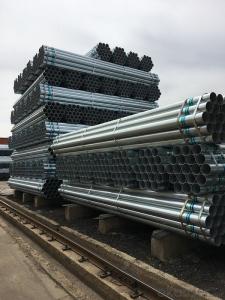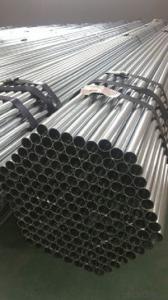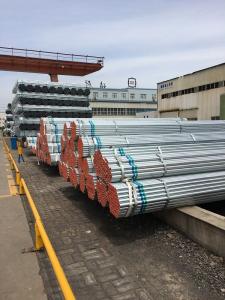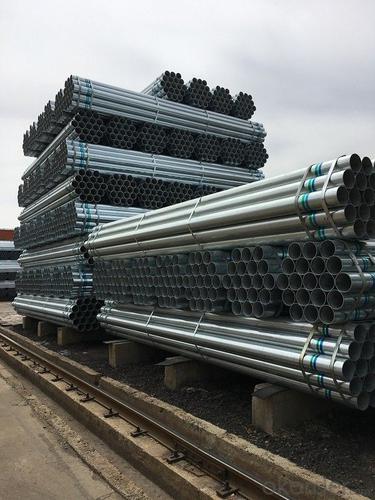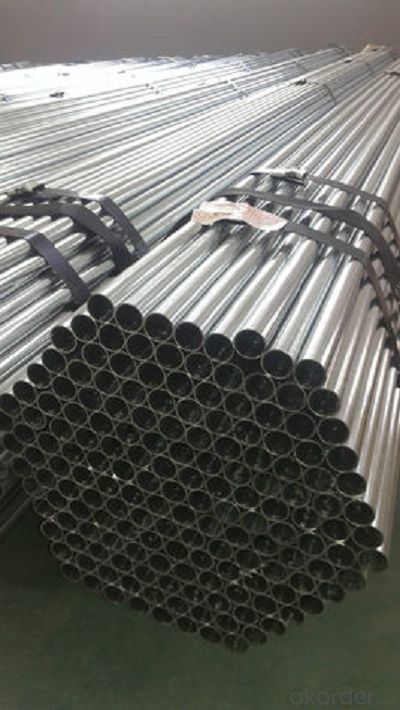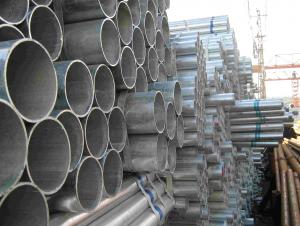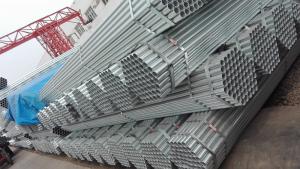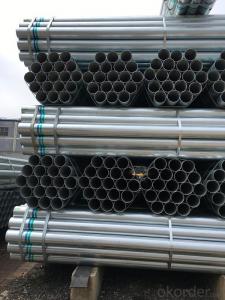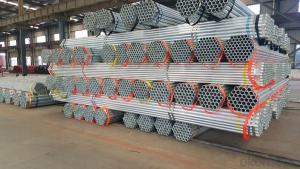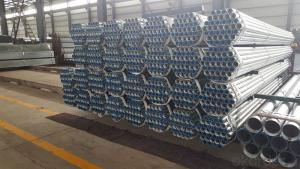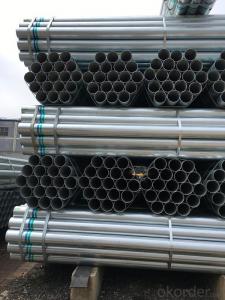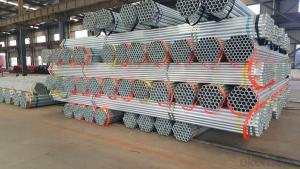Galvanized welded steel pipe for construction scaffolding
- Loading Port:
- Tianjin
- Payment Terms:
- TT OR LC
- Min Order Qty:
- 10 m.t.
- Supply Capability:
- 15000 m.t./month
OKorder Service Pledge
OKorder Financial Service
You Might Also Like
Specification
1、Structure of Galvanized steel pipe for home decoration
The surface of galvanized steel pipe welded steel pipe of hot dip galvanized layer or. Galvanized can increase the corrosion resistance of the steel tube, prolong service life. Galvanized pipe is widely used, in addition to water, gas, oil and other general low pressure fluid pipelines. It is also used in the petroleum industry, especially for offshore oil field of oil well pipe and oil pipe, chemical, coking equipment of oil heater, condensation cooler, coal run oil exchanger tube, and trestle pile, the mine tunnel support frame tube.
2、Main Features of Galvanized steel pipe for home decoration :
• High manufacturing accuracy
• High strength
• Good visual effect
• Reasonable price
3、 Galvanized steel pipe for home decoration Specification:
Standard | GB, DIN, ASTM ASTM A106-2006, ASTM A53-2007 |
Grade | 10#-45#, 16Mn 10#, 20#, 45#, 16Mn |
Thickness | 1 - 33 mm |
Section Shape | Round |
Outer Diameter | 21 - 610mm |
Place of Origin | Tianjin, China (Mainland) |
Secondary Or Not | Non-secondary |
Application | Hydraulic Pipe |
Technique | Cold Drawn |
Certification | API |
Surface Treatment | factory state or painted black |
Special Pipe | API Pipe |
Alloy Or Not | Non-alloy |
Length | 5-12M |
Outer Diameter | 21.3-610mm |
Grade | 20#, 45#, Q345, API J55, API K55, API L80, API N80, API P110, A53B |
Standard | ASME, ASTM |
1) Material:Q195 Q235 Q345 X42 X52
2) Specification range:OD:21.3-610mm,WT:6-70mm,length:6-12m or according to the requirement of clients.
3) Excutive standards:GB,ASME API5L.ASTM A 106/A53,Despite of the above standards,we can also supply seamless steel pipe with standard of DIN,JIS,and so on,and also develop new products according to the requirements of our clients!
4) Surface: galvanized.
5) Ends:Beveled or square cut,plastic capped,painted.
6) Packing:bundles wrapped with strong steel strip,seaworthy packing.
4、Packaging & Delivery
Packaging Details: | seaworthy package,bundles wrapped with strong steel strip |
Delivery Detail: | 15-30days after received 30%TT |
5、FAQ of Galvanized steel pipe for home decoration
①How is the quality of your products?
Our products are manufactured strictly according to national and internaional standard, and we take a test
on every pipe before delivered out. If you want see our quality certifications and all kinds of testing report, please just ask us for it.
Guaranteed: If products’ quality don’t accord to discription as we give or the promise before you place order, we promise 100% refund.
②How about price?
Yes, we are factory and be able to give you lowest price below market one, and we have a policy that “ for saving time and absolutely honest business attitude, we quote as lowest as possible for any customer, and discount can be given according to quantity”,if you like bargain and factory price is not low enough as you think, just don’t waste your time.Please trust the quotation we would give you, it is professional one.
③Why should you chose us?
Chose happens because of quality, then price, We can give you both.Additionally, we can also offer professional products inquiry, products knowledge train(for agents), smooth goods delivery, exellent customer solution proposals.Our service formula: good quality+good price+good service=customer’s trust
SGS test is available, customer inspection before shipping is welcome, third party inspection is no problem.
6、 Galvanized steel pipe for home decoration Images:
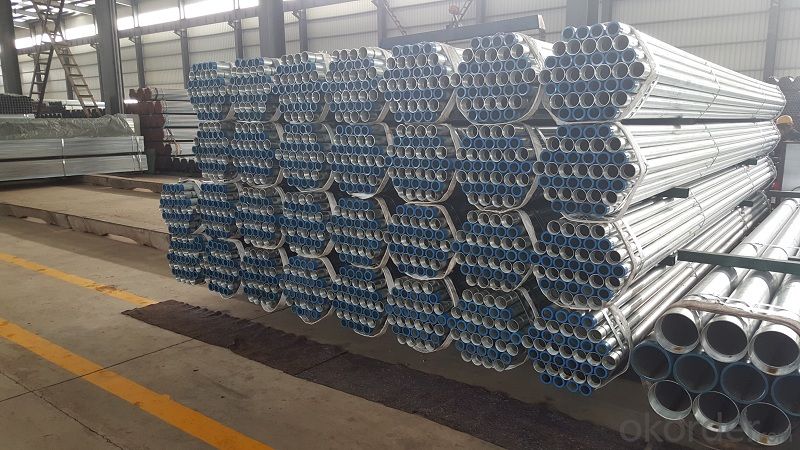
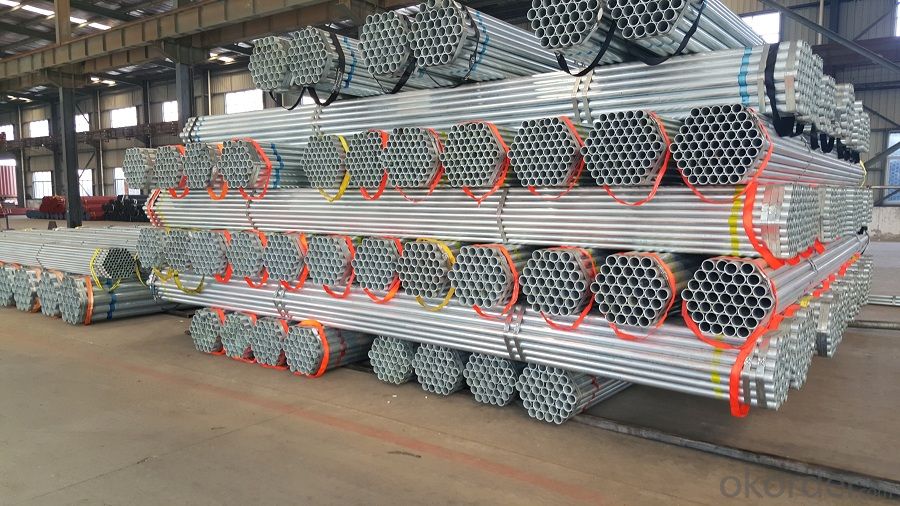
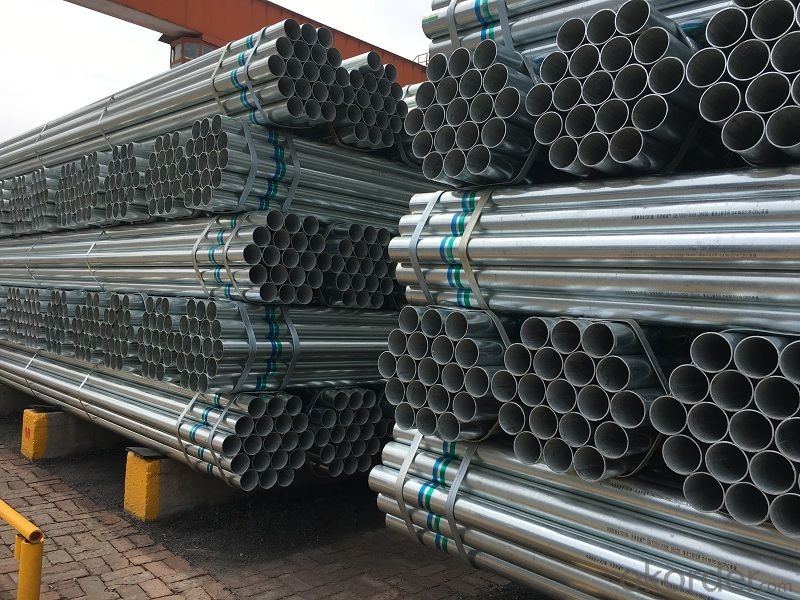
- Q: How are steel pipes protected against galvanic corrosion?
- Steel pipes are protected against galvanic corrosion through the use of sacrificial anodes, coatings, or the application of electrical currents. These methods create a barrier or redirect the corrosion process, preventing the steel pipes from deteriorating due to galvanic reactions.
- Q: How are steel pipes tested for mechanical strength?
- Steel pipes are typically tested for mechanical strength through various destructive and non-destructive testing methods. Destructive tests involve subjecting the pipes to tension, compression, or bending forces until failure occurs, allowing the measurement of their ultimate tensile strength, yield strength, and elongation. Non-destructive tests, such as ultrasonic testing, magnetic particle inspection, or radiographic examination, are also conducted to detect any internal or surface defects that may affect the mechanical strength of the pipes. These tests ensure that steel pipes meet the required standards and specifications in terms of their mechanical strength.
- Q: How are steel pipes used in the manufacturing of chemical processing equipment?
- Steel pipes are commonly used in the manufacturing of chemical processing equipment due to their durability, resistance to corrosion, and ability to handle high-pressure and high-temperature conditions. These pipes are used to transport various chemicals, gases, and liquids within the equipment, ensuring safe and efficient operations. They are also utilized for the distribution of heat transfer fluids, such as steam or hot water, to maintain optimal temperatures during chemical reactions.
- Q: What materials are used in scaffolding pipes?
- Using 48.3 * 3.6mm steel pipe, the maximum thickness of the steel pipe shall not be less than 3.24mm (there should be no serious corrosion, bending, flattening or crack); the corrosion depth of the old steel pipe shall be in accordance with the construction fastener typeProvisions on the safety technical specification for steel pipe scaffold JGJ130-2011. Take three of the corroded steel tubes, and cut the samples at the most severe parts of the rust. The corrosion depth shall not exceed the prescribed valueUse。 In addition, the approach of the steel pipe should also be sampling retest, qualified before use.
- Q: What is the average lifespan of steel pipes?
- The average lifespan of steel pipes can vary depending on various factors such as the quality of the steel used, the environment in which they are installed, and the maintenance and care they receive. However, on average, well-maintained steel pipes can last anywhere from 50 to 100 years or more.
- Q: How are steel pipes used in the manufacturing of chemical processing plants?
- Steel pipes are commonly used in chemical processing plants for various purposes such as transporting fluids, gases, and chemicals within the facility. They are utilized for the safe and efficient transfer of raw materials, intermediate products, and final products throughout different stages of the manufacturing process. Steel pipes provide excellent strength, durability, and resistance to corrosion, making them suitable for handling corrosive materials and operating under high pressure and temperature conditions. Additionally, steel pipes can be welded and connected easily, allowing for customized configurations and efficient installation in chemical processing plants.
- Q: What are the thermal properties of steel pipes?
- Steel pipes have excellent thermal conductivity, allowing them to efficiently transfer heat. They also have a high melting point, making them suitable for high-temperature applications. Moreover, steel pipes have a low coefficient of thermal expansion, meaning they can withstand significant temperature changes without warping or deforming.
- Q: How are steel pipes coated to prevent external corrosion?
- Steel pipes are commonly coated to prevent external corrosion through various methods such as galvanization, epoxy coating, or polyethylene wrapping. These coatings act as barriers between the steel surface and the external environment, protecting the pipes from moisture, chemicals, and other corrosive elements.
- Q: What place must use galvanized steel pipe to make lighting line?
- Galvanized pipe for pipeline laying construction and transformation of lighting, power, telephone, fire protection system in the engineering (made of galvanized steel), for laying, laying can be laid in the dark, the wall can also be installed on the ceiling.
- Q: How to make the internal tooth of the steel pipe?
- Cylindrical thread can be used, if the tube is too long, you may consider a short tube with thread, and then welded to the long tube. Taper thread is more difficult to use than ordinary vehicle, and the tap is generally considered. The tap can be clamped on the tailstock.
Send your message to us
Galvanized welded steel pipe for construction scaffolding
- Loading Port:
- Tianjin
- Payment Terms:
- TT OR LC
- Min Order Qty:
- 10 m.t.
- Supply Capability:
- 15000 m.t./month
OKorder Service Pledge
OKorder Financial Service
Similar products
Hot products
Hot Searches
Related keywords
